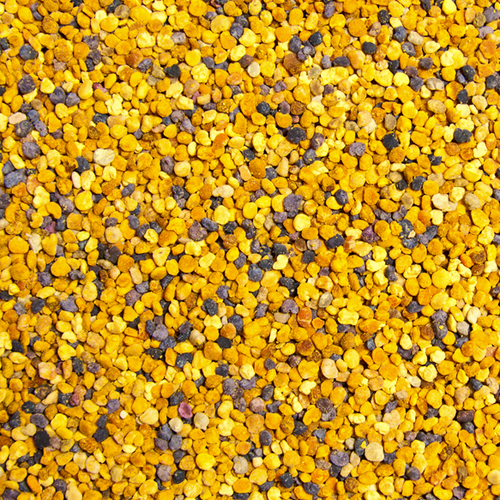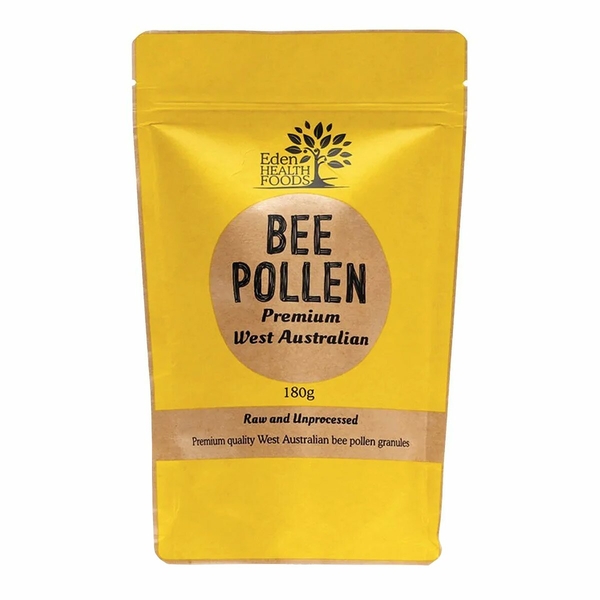
Bee pollen
Alternative names: Bee Pollen Extract, Buckwheat Pollen, Extrait de Pollen d'Abeille, Honeybee Pollen, Honey Bee Pollen, Maize Pollen, Pine Pollen, Polen de Abeja, Pollen, Pollen d'Abeille, Pollen d'Abeille de Miel, Pollen de Sarrasin
Actions: Immune Stimulation, Wound healing effect
Background
Bee pollen is flower pollen that's collected by worker bees, mixed with nectar and bee saliva, and then packed into honeycomb cells in the hive.
Bee pollen might help stimulate the immune system, but it's not clear how bee pollen causes these effects.
People take bee pollen for athletic performance, hay fever, eczema, constipation, obesity, and many other conditions, but there is no good scientific evidence to support these uses. There is also no good evidence to support using bee pollen for COVID-19.
Bee pollens come from many different plants, so the contents of bee pollen can vary significantly. Don't confuse bee pollen with beeswax, bee venom, honey, propolis, or royal jelly. These other bee products are not the same.
Bee pollen might help stimulate the immune system, but it's not clear how bee pollen causes these effects.
People take bee pollen for athletic performance, hay fever, eczema, constipation, obesity, and many other conditions, but there is no good scientific evidence to support these uses. There is also no good evidence to support using bee pollen for COVID-19.
Bee pollens come from many different plants, so the contents of bee pollen can vary significantly. Don't confuse bee pollen with beeswax, bee venom, honey, propolis, or royal jelly. These other bee products are not the same.
Safety Safety definitions
When taken by mouth: Bee pollen is possibly safe when used for up to 30 days. It's usually well-tolerated, but some people might experience allergic reactions.
Breast-feeding: There isn't enough reliable information to know if bee pollen is safe to use when breast-feeding. Stay on the safe side and avoid use.
Pollen allergy: Bee pollen can cause serious allergic reactions in people who are allergic to certain types of pollen. Symptoms can include itching, swelling, shortness of breath, light-headedness, and a severe reaction called anaphylaxis.
Special Precautions & Warnings:
Pregnancy: Taking bee pollen by mouth is possibly unsafe during pregnancy. It might stimulate the uterus and threaten the pregnancy. Don't use it.Breast-feeding: There isn't enough reliable information to know if bee pollen is safe to use when breast-feeding. Stay on the safe side and avoid use.
Pollen allergy: Bee pollen can cause serious allergic reactions in people who are allergic to certain types of pollen. Symptoms can include itching, swelling, shortness of breath, light-headedness, and a severe reaction called anaphylaxis.
Effectiveness
NatMed Pro rates effectiveness based on scientific evidence according to the following scale: Effective, Likely Effective, Possibly Effective, Possibly Ineffective, Likely Ineffective, Ineffective, and Insufficient Evidence to Rate.
Possibly ineffective Effectiveness definitions
- Athletic performance. Taking bee pollen by mouth doesn't seem to improve athletic performance.
Dosing & administration
There isn't enough reliable information to know what an appropriate dose of bee pollen might be. Keep in mind that natural products are not always necessarily safe and dosages can be important. Be sure to follow relevant directions on product labels and consult a healthcare professional before using.
Interactions with pharmaceuticals
Warfarin (Coumadin)
Interaction Rating=Moderate Be cautious with this combination.
Bee pollen might increase the effects of warfarin. Taking bee pollen with warfarin might result in an increased chance of bruising or bleeding.
Interactions with herbs & supplements
There are no known interactions with herbs and supplements.
Interactions with foods
There are no known interactions with foods.
vital.ly has licensed monographs from TRC Healthcare.
This monograph was last reviewed on 16/01/2025 11:00:00 and last updated on 23/05/2018 20:11:00. Monographs are reviewed and/or updated multiple times per month and at least once per year.
Natural Medicines disclaims any responsibility related to medical consequences of using any medical product. Effort is made to ensure that the information contained in this monograph is accurate at the time it was published. Consumers and medical professionals who consult this monograph are cautioned that any medical or product related decision is the sole responsibility of the consumer and/or the health care professional. A legal License Agreement sets limitations on downloading, storing, or printing content from this Database. No reproduction of this monograph or any content from this Database is permitted without written permission from the publisher. It is unlawful to download, store, or distribute content from this site.



